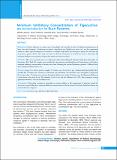Please use this identifier to cite or link to this item:
https://hdl.handle.net/20.500.14356/1286| Title: | Minimum Inhibitory Concentration of Tigecycline on Acinetobacter in Burn Patients |
| Authors: | Jaiswal, Bisekha Timalsina, Laxmi Karki, Sushmita Shrestha, Sanjit Koirala, Surakshya |
| Citation: | JaiswalB., TimalsinaL., KarkiS., ShresthaS., & KoiralaS. (2020). Minimum Inhibitory Concentration of Tigecycline on Acinetobacter in Burn Patients. Journal of Nepal Health Research Council, 18(3), 431-435. https://doi.org/10.33314/jnhrc.v18i3.2530 |
| Issue Date: | 2020 |
| Publisher: | Nepal Health Research Council |
| Article Type: | Original Article |
| Keywords: | Acinetobacter spp AST Burn MIC Tigecycline |
| Series/Report no.: | Jul-Sep 2020; |
| Abstract: | Abstract Background: Burn infection is a major cause of morbidity and mortality in spite of significant improvements in burn care and treatment. Pseudomonas aeruginosa, Acinetobacter spp., Staphylococcus aureus etc. are the commonest isolates in which rapid development of resistance to multiple drugs limits the therapeutic options for infections by Acinetobacter species. Hence, this study was done to find the occurrence of Acinetobacter and to determine the minimum inhibitory concentration of tigecycline against Acinetobacter isolates. Methods: This cross-sectional study was conducted in Phect-Nepal Hospital, Kirtipur, Nepal from September to December 2018. Total 205 samples were included for the isolation and identification of Acinetobacter and further minimum inhibitory concentration of isolates were done following the standard laboratory protocol. Collected data were analyzed by SPSS version 23.0. Results: Among 155 culture positive samples, 27 isolates were Acinetobacter spp. Antimicrobial Susceptibility Test revealed that 24 isolates were resistant to ceftriaxone and ceftazidime, but all isolates were susceptible to polymyxin B. For tigecycline, 19 isolates were resistant through dis diffusion test while 20 isolates cross the Minimum Inhibitory Concentration value from E test. The reliability of the E-test and disc diffusion was 0.920, which represent strong agreement between E- test and dis diffusion test. Conclusions: Tigecycline resistance is presenting as serious problem to the management of infection caused by Acinetobacter species. Therefore, minimum inhibitory concentration for the detection of resistance should be included in routine laboratory diagnosis. Keywords: Acinetobacter spp.; AST; burn; MIC; tigecycline |
| Description: | Original Article |
| URI: | http://103.69.126.140:8080/handle/20.500.14356/1286 |
| ISSN: | Print ISSN: 1727-5482; Online ISSN: 1999-6217 |
| Appears in Collections: | Vol. 18 No. 3 (2020): Vol. 18 No. 3 Issue 48 Jul-Sep 2020 |
Files in This Item:
| File | Description | Size | Format | |
|---|---|---|---|---|
| 2530-Manuscript-18837-1-10-20201115.pdf | Fulltext Article. | 699.61 kB | Adobe PDF |  View/Open |
Items in DSpace are protected by copyright, with all rights reserved, unless otherwise indicated.
